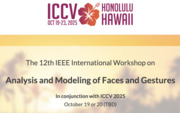 | AMFG2025: 12th IEEE International Workshop on Analysis and Modeling of Faces and Gestures ICCV Honolulu, HI, United States, October 19-23, 2025 |
| Conference website | https://fulab.sites.northeastern.edu/amfg2025/ |
| Submission deadline | June 25, 2025 |
The 12th IEEE International Workshop on Analysis and Modeling of Faces and Gestures:
In conjunction with ICCV 2025, October 19 or 20 (Workshop Day TBD)
The domains of face, gesture, and cross-modal recognition have experienced tremendous progress fueled by deep learning and large-scale annotated datasets. From the early days of AlexNet to today's transformer-based architectures, performance across public benchmarks has improved dramatically. However, this success has come at a cost — namely, decreased model explainability, limited generalization to unconstrained environments, and a growing dependence on opaque, pre-trained systems.
Despite saturation on traditional datasets, real-world applications often reveal critical weaknesses: performance degrades under extreme pose variations, poor lighting conditions, partial occlusions, or unpredictable subject behavior. Addressing these limitations requires robust training strategies, improved data representations, and more comprehensive, interpretable models.
Meanwhile, multimodal learning has surged, integrating signals such as voice, face, and gesture to power applications in social media, human-computer interaction (HCI), surveillance, and affective computing. The next generation of systems must go beyond recognition — they must reason, adapt, and function reliably in complex, real-world conditions.
Submission Guidelines
Important Dates
| [ 06/27/2025 ] | Submission Deadline |
| [ 07/10/2025 ] | Notification |
| [ 08/18/2025 ] | Camera-Ready Due |
Author Guidelines
Submissions are handled via the workshop's OpenReview page.
Follow the official ICCV2025 guidelines: ICCV Submission Guidelines
- 8 pages (excluding references)
- Anonymous submission
- Use the ICCV LaTeX templates
Topics of Interest
Core Vision Tasks
- Face, gesture, and full-body detection in images and videos
- 2D and 3D tracking of faces, hands, bodies, and actions across time
- Robust recognition across pose, occlusion, age, illumination, and resolution
- Segmentation and parsing of face and body parts for fine-grained analysis
Generative & Neural Rendering
- Face and body generation, manipulation, and swapping (e.g., talking face, deepfakes)
- Neural rendering of expressions, dance, or gestures in AR/VR environments
- Controllable diffusion models and GANs for person-specific synthesis
- Cross-domain generative modeling (e.g., sketch-to-photo, video-to-avatar)
Learning Paradigms
- Self-supervised, semi-supervised, and unsupervised representation learning
- Few-shot, zero-shot, continual, and domain-adaptive learning techniques
- Vision-language foundation models for face/gesture understanding
- Large Vision Models (LVMs) and LLVMs as foundations or fine-tuned systems
- AutoML and architecture search for face/gesture pipelines
Soft Biometrics & Identity Understanding
- Demographic inference: age, gender, ethnicity, kinship
- Emotion, personality, attention, fatigue, and sentiment analysis
- Social signal processing and behavioral trait inference
- Explainable and trustworthy models for identity-related inference
Multimodal and Cross-Modal Analysis
- Fusion of visual, audio, depth, IMU, EEG, and biosignal data
- Multimodal transformers for joint face-body-speech analysis
- Cross-modal generation: text-to-face, speech-to-gesture, etc.
- Alignment and synchronization across modalities (e.g., lip-sync)
Applications, Benchmarks, and Analysis
- Benchmark creation, dataset curation, and annotation protocols
- Deployment studies and case reports in real-world scenarios
- Failure analysis, uncertainty estimation, and model auditing
- Interactive and interruptible AI systems for decision support
Nature-Inspired & Cognitive Systems
- Bio-inspired models of face and gesture perception
- Vision systems for ethology, animal behavior, and neuroscience
- Cognitive modeling of gaze, micro-expressions, and attentional cues
- Integrating affective computing with behavioral science
Ethics, Fairness, and Society
- Bias mitigation in demographic recognition and identity verification
- Interpretability and transparency in face/gesture pipelines
- Regulatory frameworks and societal impacts of face technologies
- AI for accessibility, assistive tech, and inclusive HCI
Committees
General Chair
|
Workshop Chairs
- Joseph P. Robinson, Amazon Robotics, USA, Website
- Ming Shao, UMass, Lowell, USA, Website
- Sheng Li, University of Virginia, USA, Website
- Zhiqiang Tao, Rochester Institute of Technology, USA, Website
- Yu Yin, Case Western Reserve University, USA, Website
Contact
Questions? Reach out to us at amfg.workshop@gmail.com!
